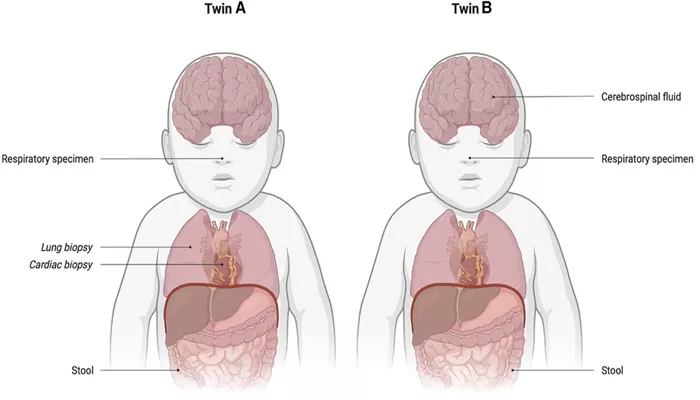Enteroviruses are a group of viruses that can cause a wide range of illnesses, from mild respiratory symptoms to severe, life-threatening conditions. While many enterovirus infections are relatively harmless, they can sometimes lead to complications that affect the heart, a condition known as enteroviral myocarditis. In this article, we will explore the relationship between enteroviruses and heart disease, focusing on the potential impact of these viruses on cardiac health.
What Is Enteroviruses?
Enteroviruses belong to the Picornaviridae family and are among the most common viral infections in humans. They are transmitted through contact with infected individuals, contaminated surfaces, or exposure to respiratory droplets.
Enterovirus infections are particularly prevalent in children, with an estimated 10 to 15 million symptomatic cases occurring annually in the United States alone.
SEE ALSO: What Is The Incidence of Myocarditis After COVID Vaccine?
Enteroviral Myocarditis
Myocarditis is an inflammation of the heart muscle (myocardium) that can be caused by various factors, including viral infections.
Enteroviruses, particularly the Coxsackie B group, are responsible for approximately 25-35% of confirmed cases of myocarditis and pericarditis.
When an enterovirus infects the heart, it can cause direct damage to the myocardium, leading to inflammation and impaired cardiac function. This condition is known as enteroviral myocarditis. While only a small percentage of enterovirus infections result in overt cardiac involvement, the consequences can be severe.
Symptoms And Diagnosis
The symptoms of enteroviral myocarditis can vary widely, ranging from mild chest pain and fatigue to life-threatening heart failure. Some common symptoms include:
- Fever
- Chest pain
- Shortness of breath
- Palpitations
- Fatigue
- Swelling in the legs or abdomen
In neonates and infants, enteroviral myocarditis may present with more severe symptoms, such as shock, seizures, and cardiorespiratory arrest.
Diagnosing enteroviral myocarditis involves a combination of clinical history, physical examination, and diagnostic tests.
These may include:
Electrocardiogram (ECG): Showing abnormalities in heart rhythm and electrical activity
Echocardiogram: Assessing heart structure and function
Cardiac biomarkers: Measuring levels of troponin and creatine kinase-MB (CK-MB), which indicate heart muscle damage
Viral PCR testing: Detecting the presence of enterovirus in blood, stool, or respiratory samples
Cardiac MRI: Providing detailed images of the heart and identifying areas of inflammation
Endomyocardial biopsy: Obtaining a small sample of heart tissue for histological analysis and viral detection
Risk Factors And Complications
Certain factors may increase the risk of developing enteroviral myocarditis or worsen its severity, such as:
Age: Neonates and infants are particularly vulnerable, accounting for approximately 40% of enterovirus infections.
Underlying heart disease: Individuals with pre-existing heart conditions may be more susceptible to complications.
Viral load: A higher concentration of virus in the blood is associated with more severe disease.
Complications of enteroviral myocarditis can be life-threatening and include:
- Acute heart failure
- Arrhythmias
- Cardiogenic shock
- Dilated cardiomyopathy
- Sudden cardiac death
Treatment And Management
There is no specific antiviral treatment for enteroviral myocarditis, and management primarily focuses on supportive care and managing complications. Depending on the severity of the condition, treatment may include:
- Mechanical ventilation
- Inotropic support
- Extracorporeal membrane oxygenation (ECMO)
- Immunosuppressive therapy (in some cases)
In severe cases, immunosuppressive medications such as corticosteroids and intravenous immunoglobulins (IVIG) may be considered, although their efficacy is not well-established.
Patients with enteroviral myocarditis are typically advised to avoid strenuous physical activity for several months after recovery to allow the heart to heal and prevent further damage.
Prevention And Public Health Concerns
While there is no vaccine available for enteroviruses, preventive measures can help reduce the risk of transmission and infection:
Frequent handwashing with soap and water
Avoiding close contact with infected individuals
Covering coughs and sneezes
Disinfecting frequently touched surfaces
The recent increase in severe cases of enteroviral myocarditis in neonates within Wales and South West England has raised public health concerns. These cases highlight the need for increased awareness, surveillance, and research into the prevention and treatment of this condition.
Conclusion
Enteroviruses are a common cause of viral infections, and while most cases are mild, they can sometimes lead to serious complications affecting the heart. Enteroviral myocarditis is a potentially life-threatening condition that requires prompt diagnosis and management. By understanding the risks, symptoms, and preventive measures associated with enteroviral infections, healthcare professionals and the public can work together to minimize the impact of this disease on cardiac health.

